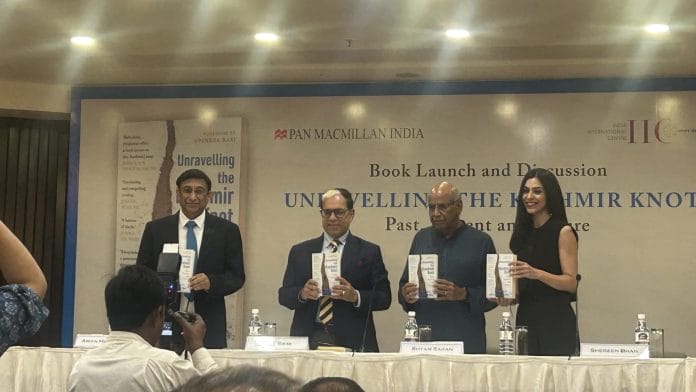New Delhi: Can the Kashmir issue be resolved through legal means? This question dominated the discussion at the re-release of Supreme Court advocate Aman Hingorani’s book, ‘Unravelling the Kashmir Knot’.
The panellists, including senior journalist Shireen Bhan, former foreign secretary Shyam Saran and retired Supreme Court judge Arjan Kumar Sikri, were clear about the need to ask this question, particular with the completion of five years of abrogation of Article 370, which granted special status to Jammu and Kashmir.
At the event, held at the India International Centre on 2 August, Saran remained unequivocal about the limitations of legal approaches. His biggest inhibition was that if India and international communities began to look at Kashmir through a legal prism, then there would be a need to look at counter legal issues as well. “There are many pitfalls in taking a legal route. It makes us vulnerable in ways that we are not mindful of,” he said.
Justice Sikri acknowledged Kashmir’s role as a focal point in the current geopolitics. While repeatedly calling Kashmir a “volatile place with deep-seated conflicts,” he commended Hingorani for suggesting that “the International Court of Justice (ICJ) could provide a pathway forward.”
“This book gives solutions and talks about problematic points including what Kashmir was and what people have been facing, who the stakeholders are, and what makes Kashmir a disputed territory,” he said.
Justice Sikri also raised the issue of insurgency in Jammu in the past few weeks, calling the situation worrying. “Whether Article 370 was really a lasting solution or not is not known,” he said, adding that Hingorani’s suggestion that the ICJ might be able to provide a solution “needs a discussion.”
Various aspects of Kashmir issue
Hingorani emphasised his non-Kashmiri status, recounting his journey from 1995 as part of his doctoral research. The author said his research for the book involved going through countless pages of investigative reports, which led him to uncover striking facts about Kashmir and India’s role in making it an international issue.
During the conversation, he discussed how India ceded a part of Kashmir’s territory to Pakistan in 1966, which “constitutionally, still belongs to India.”
Hingorani argued that while law may not offer a complete resolution, it can shift the political discourse. According to him, the Kashmir issue’s legal elements are intertwined with its political dimensions, making it clear that while law alone cannot resolve the Kashmir conflict, it remains a crucial part of the broader solution.
He emphasised the various dimensions that need to be taken into consideration while talking about the Kashmir issue— self-determination for Kashmiri Muslims, displacement for Kashmiri Pandits, law and order for security forces, and the disputed territory tag for international bodies.
“J&K was acceded to India, we accepted the condition of accession. We took it to the UN, we gave Pakistan the standing to comment on Kashmir on international platforms. We made it an international issue. We facilitated international committees to call it a disputed territory,” he said, adding that at last, while Kashmir is a political issue, it is important to realise that “it has legal elements to it.”
Reacting to the conversation, Kamal Malhotra, a former UN member in the audience, told ThePrint, “I was expecting something more substantive about what the book says and the ICJ solution. India made a mistake by internationalising it at the time of Independence. India has been fighting to make it a domestic issue, which cannot happen now. Now to take it international again and then to accept the verdict, I can’t see the Indian government doing that, he said. “I don’t see it [going to ICJ] as a solution.”
Another audience member, Usha Rekhi, said that the conversation put things into perspective for her. “I liked that they highlighted that Britishers were one of the parties that made this problem come up. I have also been a victim of Partition; I am from Lahore. It was just interesting,” she said.
(Edited by Prashant)






